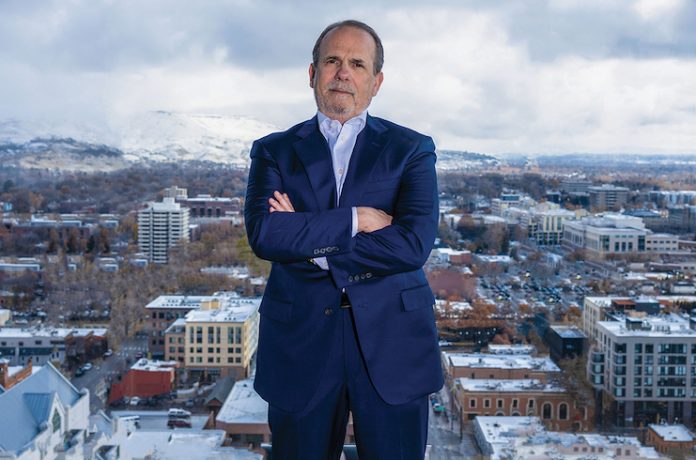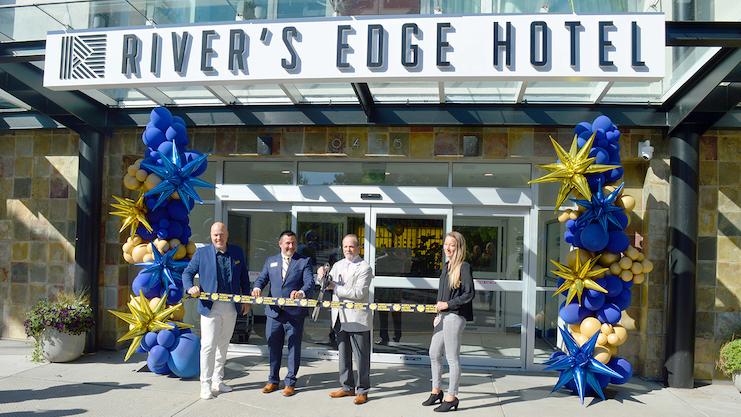
Newly retired hospitality icon Eric Danziger, who may be best remembered as the only CEO of Trump Hotels who wasn’t a Trump family member, recently spoke with LODGING about his career climb from Fairmont San Francisco bellman to CEO of Starwood Hotels, Wyndham Hotel Group, and, of course, Trump Hotels. However, as he mentioned while sharing his “success story,” it was his fortunate track record of growing companies that prompted the Trumps, among others, to tap him to undertake many of the challenges he described.
Early Career
Fresh out of high school in San Francisco in 1971, Danziger entered the industry as a bellman at the city’s Fairmont hotel. “That was a time when world-class meant everything was shiny and crisp, including coins that were washed and dollar bills that were ironed,” he recalled. That began a dizzying career climb that kept him and his family on the move, tracing a path through San Diego, New Orleans, Nashville, Charlotte, Kansas City, Tucson, Houston, Phoenix, Dallas, New York, and finally, Idaho.
He became GM of a full-service, Four Diamond hotel at age 25, after completing a management training program and rotating through various positions with the Fairmont organization, including front office manager at a 600-room hotel in San Diego, where he met his first mentor, Jack Vaughn.
Vaughn, who created the Opryland Hotel as a convention destination, sent him to Nashville to become rooms division manager two years before construction began on the first 600-room phase of the property. As he tells the story—and he loves to tell stories—“My wife and I rented a U-Haul to go from New Orleans to Nashville. At first, it was just me, a salesman named Mike Dimond, and a cat named Opry working in a trailer on the site, where they hadn’t yet broken ground.” His role expanded as the hotel grew to almost 3,000 rooms. This “spectacular opportunity,” he said, let him “be a part of putting together a major convention hotel in the middle of the country.” It also enabled him to forge a bond with Vaughn until his death in 2014.
Leadership Positions
DoubleTree: Danziger’s success garnered a fair amount of attention in the hotel community and netted a recruiting call in 1979 from another mentor-turned-friend, Jim Schmidt, who was president of DoubleTree Hotels when it was still a young company. In telling this story, he recalled how Schmidt proceeded to “bait” him with an enticing offer to run a waterfront property in Monterey, only to “switch” to a far less attractive offer: “a problem resort in Tucson.” The problem, he explained, was that they had been unable to even pay the interest on the principal they had undertaken.
Danziger did pull it off, but it came at a painful cost. “In the first year, I was able to pay back all of the past due interest, but within the first 45 days, I let go of 20 of 26 managers,” he said. “I had to get people to understand that it is a business, and we all have a part to play that affects everyone else; it was mostly about raising people’s responsibility and accountability.” His reward for this job well done was a move to Houston to open a DoubleTree at George Bush Intercontinental Airport. Three years later, he became a regional vice president with DoubleTree in Kansas, and after that he transferred as EVP operations to the headquarters in Phoenix, a favorite city where he still maintains a home. In this position, he was involved in development for the first time. “In addition to operating the hotels, I participated with the development team in securing new management contracts and assuring owners of our ability to outperform and exceed expectations,” he said.
All told, he spent 11 “terrific” years with DoubleTree that saw enormous growth in the company plus the introduction, in 1985, of the DoubleTree cookie, which “accidentally became an icon” when guests brought them home for their families to enjoy.
Wyndham: His next opportunity came in 1990, when Trammel Crow, then the world’s largest real estate developer, brought him to Dallas to work his turnaround magic during a real estate bust as CEO of Wyndham. “To get out of hock, we had to sell hotels to the Stouffers Hotel Company and start from scratch, but we ended up with a wonderful portfolio, including some of the world’s best hotels.” The turnaround, he said, led to “an incredibly successful IPO in 1995 for Wyndham Hotels.”
Starwood: Danziger said he expected to remain at Wyndham long term, but in 1996, Barry S. Sternlicht, now chairman & CEO Starwood Capital Group, came with an offer he couldn’t refuse: the chance to move himself and the company to his city of choice, Phoenix.
Thus commenced a period of tremendous growth: “We were pretty much buying a hotel every Tuesday, and my corporate office staff went from eight to 200 in about 18 months.” Danziger was especially impressed by Sternlicht. “He brought in an amazing tool to acquire hotels called the paired-share REIT, but then started taking a more hands-on role.” He was also behind the development of the Heavenly Bed, which Danziger called “one of the most inventive things that has happened in this industry since the beginning of time.”
Back to Wyndham: In 1996, he returned to Wyndham as CEO, picking up what had become a fast-growing global company with some 12 to 14 brands in 72 countries. Danziger considers his biggest accomplishment there to be creating the Wyndham Hotel Group from what had been 12 independent brands. “They said it couldn’t be done, but I brought together 8,000 owners in a conference in Las Vegas in 2008 and launched it,” he related.
Trump Hotels: Then, in 2015, came the call from Ivanka Trump. “She said they had been following my career, and although they had never had a CEO, they had ‘exciting expansion plans’ and asked to meet with me,” Danziger said.
Seeing the opportunity for “a guy like me that grows companies,” Danziger took the job. “I’m proud that, despite everything we went through once Trump became a candidate, then president, the brand is still doing well. It was also a wonderful experience for me, and I’m the only guy who will ever have that experience.”
Winding Down
But commuting between the family home in Phoenix and New York got old, and they already had a second home in Boise, Idaho, near his son. So, in 2021, he and his wife, Jenny, moved to Boise, where he connected with the founders of Braintree Group. “They were looking for a CEO and wanted to grow, and I thought Braintree would offer the chance to do something different,” he said. Shortly after Danziger joined Braintree Group, he successfully helped launch Resolute Road Hospitality, a third-party management company. The decision to retire after nearly two years, he said, was prompted by a health scare and a big upcoming birthday. “I realized that I needed to rebalance the work–life balance more in favor of life, not work.”
Career Reflections
Looking back, Danziger said, “Apart from being a good dad and husband, I hope my legacy—to the extent there is one—is that I mattered to people’s careers and lives, encompassing their families.” His own globe-trotting career path notwithstanding, Danziger said he always made a point of learning about the individual personal and professional goals of candidates he was considering for key positions, including where they would like to live, knowing it could make all the difference in their success. This approach, he said, served him well. “At this point, there are many hundreds of GMs and corporate leaders who once worked for me. I want them to know how grateful I am to them for making me look better than I am.”
Mantras and Messages From a Wealth of Hospitality Experience
Eric Danziger is now retired after 53 years in the hotel industry, but he welcomes the opportunity to share some of what he’s learned. “I enjoy having people remember things they learned from me,” he said. “I especially like to convey messages through stories, because doing it within the context of a story makes it easy to grasp and recall.”
There are some pithy thoughts he calls “mantras,” such as those below:
- We have to remember that ours is a two-name industry: the first name is hospitality, but the last name is business.
- It’s important to have a company made up of people with different minds but like hearts.
- The question to guests that matters most is this: Did we exceed your expectations or not?
- A failure to hit the bull’s-eye is never the fault of the target.
- Reasonable people always get to a reasonable place.
Danziger mentioned another thing he’s learned while traveling the world during a long and satisfying career, experiencing vast differences in people, culture, and ways of doing business: “Hospitality is hospitality. Whether it’s done with a bow or a handshake, in all cases, there’s a smile.”














